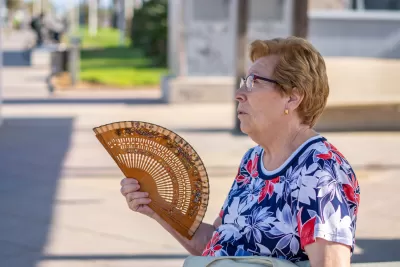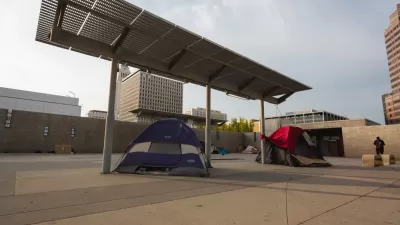Without the resources of larger cities, towns with fewer resources can still work to coordinate efforts across agencies and plan for heat events early in the year.

How can small towns that lack the resources of bigger cities prepare their agencies and residents to prepare for and respond to extreme heat events? Ysabelle Kempe explores the issue in Smart Cities Dive.
While some cities such as Phoenix and Houston have hired Chief Heat Officers tasked with leading cross-departmental efforts to address extreme heat events, others don’t have the funding to do so. In an interview with Smart Cities Dive, Ladd Keith, assistant professor of planning and sustainable built environments at the University of Arizona, said “Because heat is a relatively new climate risk compared to other climate risks, it’s not surprising at all to see that a couple silver bullet strategies have emerged because when you first learned about something, your knowledge is really limited.”
For Keith, one key strategy is coordination between various city and county departments, whether or not the city is able to hire a full-time climate or heat officer. For now, “I think where we’ve ended up is a lot of urban forestry efforts and a lot of focus on cooling centers.” Keith also recommends year-round planning for summer operations. “It’s not great to plan for cooling centers when it’s already hot and when it’s already summer because you’re going to have a little bit less effective coordination and missed opportunities with that.”
FULL STORY: Without chief heat officers, how can smaller cities respond to extreme heat?

Planetizen Federal Action Tracker
A weekly monitor of how Trump’s orders and actions are impacting planners and planning in America.

Map: Where Senate Republicans Want to Sell Your Public Lands
For public land advocates, the Senate Republicans’ proposal to sell millions of acres of public land in the West is “the biggest fight of their careers.”

Restaurant Patios Were a Pandemic Win — Why Were They so Hard to Keep?
Social distancing requirements and changes in travel patterns prompted cities to pilot new uses for street and sidewalk space. Then it got complicated.

California Homeless Arrests, Citations Spike After Ruling
An investigation reveals that anti-homeless actions increased up to 500% after Grants Pass v. Johnson — even in cities claiming no policy change.

Albuquerque Route 66 Motels Become Affordable Housing
A $4 million city fund is incentivizing developers to breathe new life into derelict midcentury motels.

DC Area County Eliminates Bus Fares
Montgomery County joins a growing trend of making transit free.
Urban Design for Planners 1: Software Tools
This six-course series explores essential urban design concepts using open source software and equips planners with the tools they need to participate fully in the urban design process.
Planning for Universal Design
Learn the tools for implementing Universal Design in planning regulations.
Heyer Gruel & Associates PA
JM Goldson LLC
Custer County Colorado
City of Camden Redevelopment Agency
City of Astoria
Transportation Research & Education Center (TREC) at Portland State University
Camden Redevelopment Agency
City of Claremont
Municipality of Princeton (NJ)





























